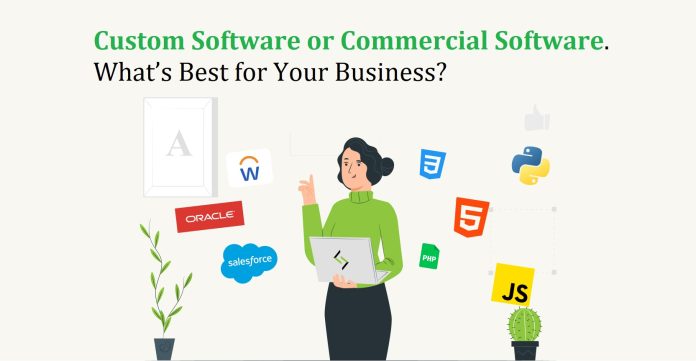Small and medium-sized firms are eager to discover new strategies to boost their competitiveness in a highly competitive business market. The development of technology allowed small business owners to reduce costs that would have been associated with running their entire company with a considerably bigger crew.
Digital solutions help companies to lower the costs involved with processing and analyzing customer information, making it simpler to undertake corporate tasks in a timely and cost-effective manner.
Which kind of software solutions should a person or business adopt, then? This blog is for everyone who needs to comprehend the differences between commercial vs. custom software development.
What exactly are custom software development solutions, and how does it vary from commercial software solutions? Alternatively, a strategic decision needs to be taken on whether to invest in commercial software or custom software development solutions.
What are Custom Software Development Solutions?
Custom software development solutions is specially designed software that is only designed for certain company needs. It’s not meant to cater to different enterprises and sectors. Instead, it is expandable to meet your changing demands as your business expands.
Due to its personalized functionality, large enterprises view bespoke software as their top option. However, small business bespoke software development is quite important and successful. You can get in touch for a no-obligation conversation to see if bespoke software development is right for you.
In order to best serve your company’s needs, custom software tools may take the form of a website, a mobile application, or any other type of software. As a result, the custom software development market differs from mass-market packaged software, such as commercial off-the-shelf software.
Examples of custom software:
Solutions provided by custom software are tailored to your company’s needs. It is most frequently used in the fast-growing markets listed below:
- Banking/financial services
- Insurance
- Retail and logistics
- Healthcare
- Highly profitable market giants frequently favour custom (or significantly modified) solutions — for example, YouTube, Netflix, Amazon, eBay, Uber, etc.
Advantages of Custom software Development
Individuality: Initial modifications to your business operations are made to custom apps.
Ease of use: A carefully thought-out design provides fewer errors and a speedy adjustment to the staff and customer funnel process.
High compatibility and independence: Automate numerous core activities while integrating and expanding software whenever you see suitable.
greater competition: To make the program more user-friendly and enhance it as necessary, you have virtually limitless alternatives for modification.
more scalability and flexibility: Only you determine what changes to make, how much to alter, and when to make them. You also receive easy scaling options to meet new difficulties as well as flexible platform transfer opportunities.
increased revenue: There is no need to pay for access or additional features.
greater security By providing advanced support, the risk of external threats is greatly diminished.
Disadvantages of Custom software Development
Expensive: The initial cost of custom development will be higher than that of any subscription plan since custom development is expensive.
Time to develop: It might take months or even years to complete a custom development project due to its complexity and length.
Trendy technology: To prevent potential commercial limitations, it is necessary to consider trends and dynamics of technology development.
What is Commercial software development?
Using software and solutions that are offered for sale by other companies’ enterprises is referred to as commercial software development. Customer service is typically included in their prices, and they are generally affordable.
Commercialized apps are developed by knowledgeable programmers and put through extensive testing before release to meet production schedules.
Examples of Commercial Software
We have always been around commercial software; in fact, it is the most common sort of software worldwide, which is another reason why businesses continue to maintain the highest standards for software development. Consider the following names if you don’t believe what kind of software you use regularly:
- Adobe Photoshop
- Corel Draw
- Microsoft Office
- Microsoft Windows
- Teamviewer
Advantages of Commercial Software Development
It saves time: The commercial program is always ready to use, and your employees or staff may already be familiar with how everything operates.
The developers have gained a reputation: Some commercial software has been available in the market for several years, which has helped the developers establish a solid reputation that clients can rely on.
Demo Available: For commercial software, a demo is always available. To determine whether to employ a commercial software solution for your company, you can always try a demo, which can range from free to premium services.
Right Pack of services: You might be able to get the proper package of services from this solution sometimes. With the correct services, you can always select a solution even if your budget is tight.
Low Upfront Costs: Instead of being sold, commercial software is intended to be licensed. A bespoke software development project entails higher initial upfront charges, therefore you’ll spend less money on those.
Popularity: An employee may already be familiar with how a well-known software program functions. Additionally, the product’s numerous other users will be reporting faults and suggesting improvements. You can evaluate the product by reading the reviews, and if you can’t, you can depend on the company’s reputation.
Versatility: You may purchase multipurpose, feature-rich solutions off the shelf since developers strive to suit the demands of a larger user group. Different plans help specify the range of features to pay for even though you might not utilize all of them.
Professional support: The program may be installed by a qualified team, and technical problems can be resolved remotely without involving your experts. Support is always looking for bugs and handling user concerns.
Disadvantages of Commercial Software development
Cannot be customized: The inability of this kind of software to be tailored to your needs makes it one of its main drawbacks if you ever wish to add or remove any function.
Unnecessary paid features: Commercial software includes many functions since it is designed for a particular sort of business. However, this may be a huge issue because you may find yourself paying for features that you never actually use. They are not necessary for you, after all.
No multiplatform programs: Multi-platform programs are incompatible with them and cannot be utilized with them, even though they are crucial for business operations and enhance each employee’s productivity.
Cannot be copied: The inability to replicate commercial software is one of its most well-known drawbacks. If you have any questions about who owns it and whether you can swim, you should check the license or the same developer.
Conclusion
Simply put, ordering from a menu at a restaurant is how pre-packaged commercial software is bought. On the other hand, creating custom software is comparable to employing a great chef who can prepare meals for your table using your preferred ingredients.
Although both commercials and Custom Software Development Solutions are frequently utilized, the decision is mostly based on the scope, objectives of current initiatives, and requirements of particular enterprises. When you are aware of the differences between the concepts, you can usually decide for yourself which kind to pick and which professionals to consult.
Author Bio:
Patel Nasrullah Co-founder Peerbits, one of the leading Top web application development company USA, in 2011. He devotes his time in inspiring young leaders to take the leap of faith. With the experience of 10 years in Web and App development, he now gives full attention to the enterprise by offering mobility solutions about the strategic planning and execution.






